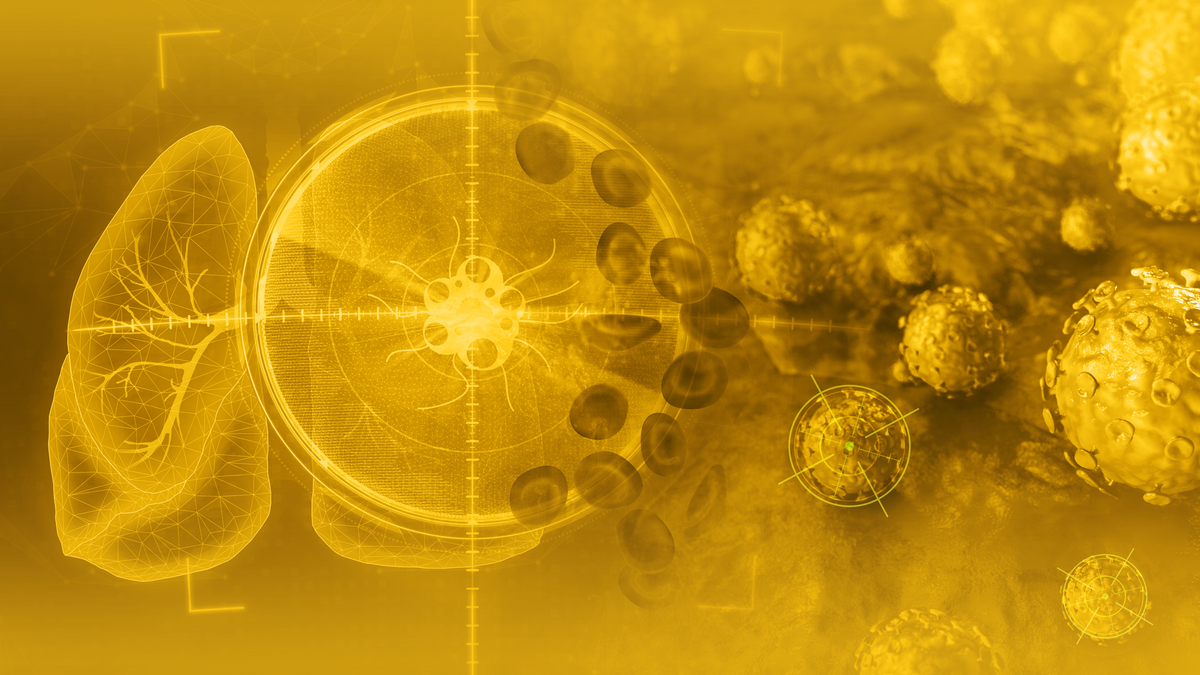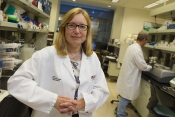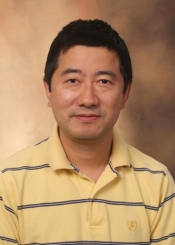Every year, nearly 10 million people die from cancer worldwide, often because it was diagnosed at an advanced stage, when it is harder to successfully treat. While research has come a long way in the early detection of various forms of cancer, there are still many hard-to-find cancers.
Biodesign Institute at Arizona State University cancer researchers Karen Anderson and Ji Qiu are on a quest to detect cancer at an earlier, more treatable stage and save lives.
Along with colleagues, they are developing promising new screening strategies, such as cancer detection through biomarkers — unique molecular footprints of disease — which can provide lifesaving early warning signals.
The Tom and Catherine Culley Charitable Trust recently gave a generous donation to the Biodesign Virginia G. Piper Center for Personalized Diagnostics, fueling Anderson’s and Qiu’s research and discoveries.
The mission of the center is to drive the discovery and development of biomarkers for the early detection of diseases. With better disease detection and earlier treatment, the center strives to have a profound impact by decreasing mortality caused by various diseases, including cancer and autoimmune diseases.
A Fountain Hills resident and widow, Catherine Culley made her philanthropic goals clear before her death at age 103 in 2021. She told “Grace Ann” Judy Streifel-Reller, philanthropy strategist for the Culley estate, “Cancer is cancer, and I want it gone.”
With a focus on funding cancer research in Arizona, the trust executor chose the Biodesign Institute because of its collaborative spirit, commitment to serving diverse populations and reputation for excellence, Streifel-Reller says.
Biomarkers to screen for HPV-related cancer
Anderson is a professor in the Biodesign Institute as well as a practicing medical oncologist at Mayo Clinic Arizona. In new research, Anderson and her colleagues explore sophisticated new methods for screening for oropharyngeal cancer — difficult both to diagnose and treat — linked to the human papillomavirus (HPV).
HPV is known to cause a variety of cancers, with the two most common being cervical and oropharyngeal cancers. Early screening for cervical cancer, through the Pap test, has drastically reduced the incidence of and deaths from this disease. However, there is no screening program for oropharyngeal cancer, making early, lifesaving diagnoses particularly challenging.
The goal of Anderson’s study is to evaluate screening strategies and biomarkers for the early detection of HPV-associated head and neck cancers, with an emphasis on the use of saliva for rapid screening.
Through the Culley Charitable Trust’s financial support, Anderson’s laboratory was able to replace a flow cytometer that was central to day-to-day operations.
“While we receive federal funding for much of our research, certain things are actually very difficult to get funding for — in this case, a piece of equipment,” Anderson says. “So this donation was transformative for our laboratory. The flow cytometer is essential because it helps us understand how the immune system is working, and we need to be able to measure that in real time.”
Biomarkers to screen for lung cancer
Qiu is a research professor at the Biodesign Institute with nearly 20 years of experience in biomarker discovery in various diseases, including lung cancer. Lung cancer is one of the leading causes of cancer death in both men and women in the United States. The American Cancer Society estimates that about 234,580 new cases of lung cancer will be diagnosed in the U.S. this year, and about 125,070 people will die from the disease.
“Early diagnosis can generally increase the chance of successful treatment for lung cancer,” Qiu says. “If diagnosed at Stage 1, the five-year survival rate is more than 50%. But if it’s diagnosed at Stage 4, the survival rate is dismal, around 5%. CT scanning can detect lung cancer early and save lives, but the compliance rate is low in the high-risk population.”
Patients may not comply with doctor’s orders because they cannot afford CT scanning, do not have convenient access to a testing facility or are not fully aware of screening benefits. Blood-based biomarkers have the significant advantages of saving time and money while being less invasive. They also have the potential for widespread clinical use, including by primary care physicians.
“There’s a need for blood-based biomarkers, which is my research, so we can detect lung cancer early and accurately so we can save lives and improve cancer patient treatments,” Qiu says.
While cigarette smoking is known as the No. 1 risk factor for lung cancer, evidence increasingly points to infections as another culprit.
“Microbial infection often elicits complex host immune responses,” Qiu explains. “Antimicrobial responses are different in cancer patients, benign nodule and high-risk smoker control groups. We use innovative microbiomics technology to study antibody response against tens of thousands of bacterial, viral and fungal proteins to identify diagnostic biomarkers that could guide a doctor’s decision on how to treat a lung nodule, whether to do a surgical biopsy, repeat CT follow-ups or surgical resection.”
Qiu and his colleagues are collaborating closely with physician scientists at Vanderbilt University Medical Center and Boston University to provide clinical samples and consult on lung cancer research. Their research will impact the clinical management of patients with CT scan findings and significantly reduce unnecessary surgeries.
Qiu says the donation from the Culley Charitable Trust makes it possible for him to explore a possible link between Valley fever, caused by a fungal infection, and lung cancer. Qiu and his colleagues will also explore whether the immune systems of people with lung cancer or benign lung disease respond differently to the fungal infection than members of the healthy population.
“We could possibly use this difference to identify lung cancer or benign lung disease,” he explains.
Sun Devil Giving Day
ASU cancer researchers rely on a steady stream of funding to advance their discoveries from the laboratory to the patient, helping cancer patients survive and thrive. Events like the 10th annual Sun Devil Giving Day on March 21 — the universitywide day of giving that encourages supporters to give to the people, programs and causes they care about at ASU — creates opportunities for donors to support impactful initiatives like cancer research. It also fosters a culture of philanthropy within the ASU community. Whether it be to advance ASU’s goals for inclusion, student success, discovery or local and global impact, Sun Devil Giving Day is an opportunity for donors to fuel some of ASU’s most impactful initiatives.
Private philanthropic support is critical to ASU’s success and has a real and lasting impact on research. Anderson and Qiu say this support fuels pilot projects in which researchers test their theories and gather preliminary evidence prior to applying for large federal grants.
“We have a laboratory where we do experiments to try to figure out how to target cancer,” Anderson says. “Every single one of those experiments requires materials. It requires support for the students who are doing this work. Not only are they getting an education, but they’re driving many of these projects and really figuring out how to get this to work. And all of that requires financial support.”
Qiu says he appreciates the support of the Culley Charitable Trust because it not only makes it possible for him to test new ideas but brings a human connection to his work.
“Although they can’t do the research themselves, I really thank them for their enthusiasm to support my research and visit my laboratory to speak with me,” he says. "It makes it more personal, and I really appreciate the experience.”
More Health and medicine

Pathak selected to lead School of Technology for Public Health
Jyotishman Pathak, an internationally recognized leader in biomedical informatics and population health sciences, will be the inaugural dean of the new School of Technology for Public Health at…

ASU teams up with Maricopa County to address local life expectancy gap
Arizona State University’s College of Health Solutions is partnering with the Maricopa County Board of Supervisors to address a 14-year life expectancy gap between residents of north Scottsdale and…

ASU professor named Rural Health Fellow
If you live in a major city, chances are you don’t spend much time thinking about what happens in smaller towns and rural areas. But Aaron Guest, an assistant professor at Arizona State…




